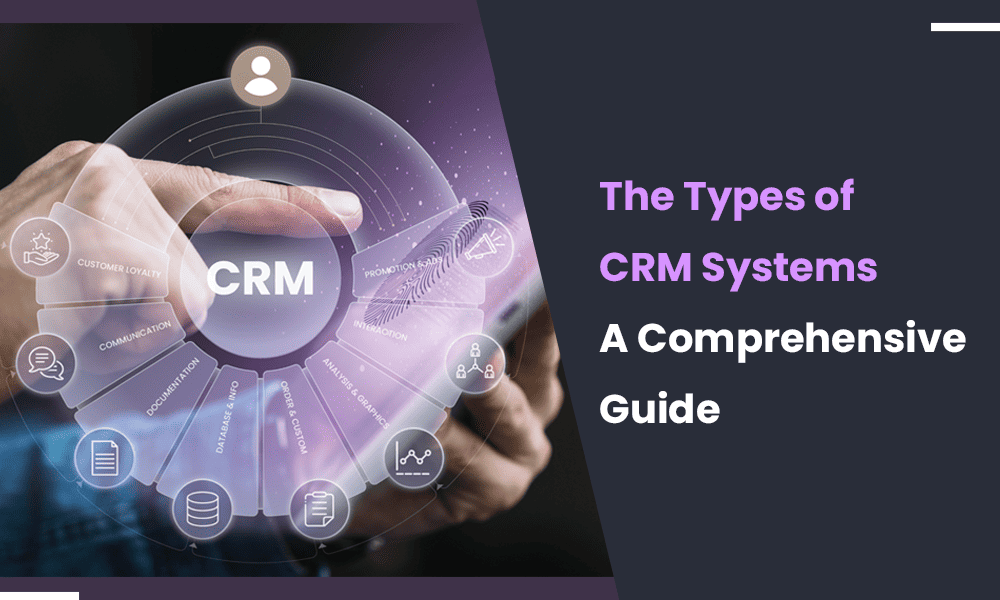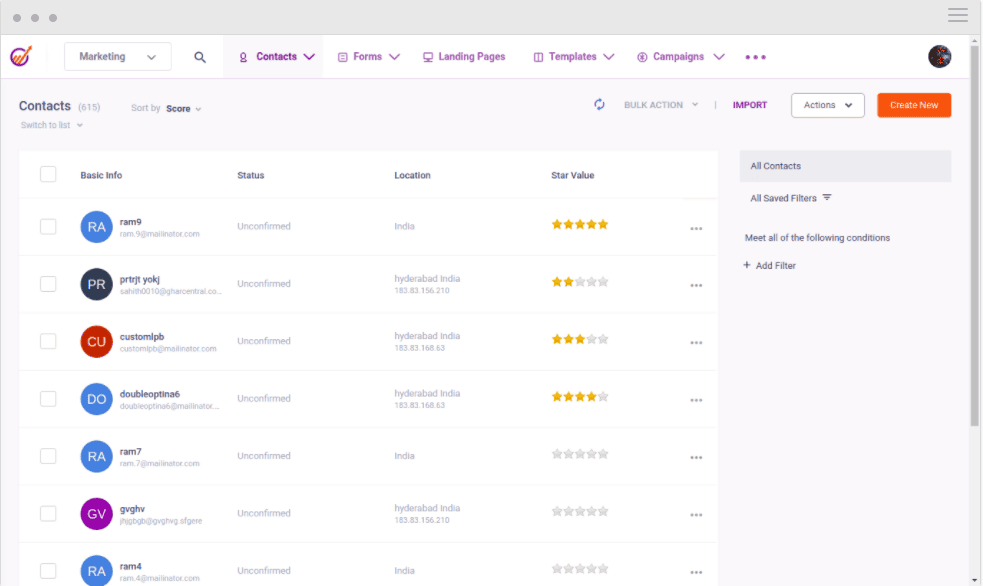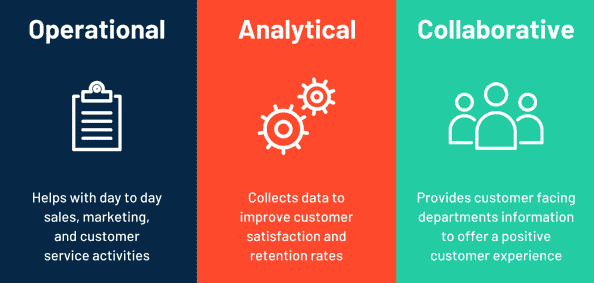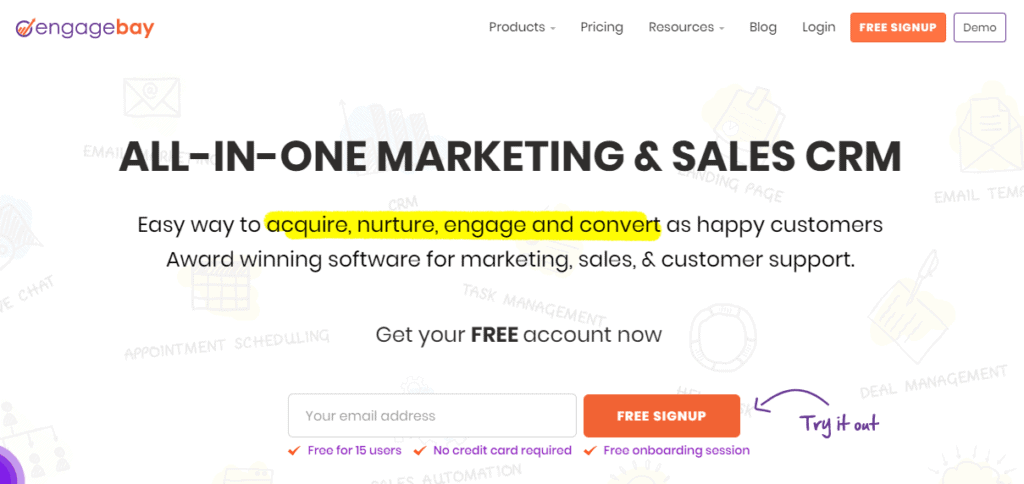Your small business is currently in search of the perfect CRM (Customer Relationship Management) software solution.
However, you have encountered a common challenge: the vast array of CRM options available in the market.
The realization that there are different types of CRM software, such as operational CRM, analytical CRM, and collaborative CRM, has added complexity to your decision-making process.
In this post, we aim to alleviate your concerns and guide you towards selecting the right CRM software for your business.
To begin, we will provide you with a comprehensive CRM meaning or definition, ensuring a clear understanding of its purpose and functionality.
Subsequently, we will delve into each type of CRM software, exploring their unique characteristics and applications in greater detail.
Understanding that choosing the ideal CRM software involves careful consideration, we will highlight a handful of factors for you to contemplate before finalizing your purchase decision.
By contemplating these essential factors, you will be better equipped to navigate the diverse landscape of CRM software options and make an informed choice.
Upon completing this read, you will possess a comprehensive knowledge of the various types of CRM software available.
Furthermore, armed with this understanding, you will be able to identify and select the precise CRM software type that aligns best with your small business’s unique needs and objectives.
Table of Contents
What Is CRM Software?
As promised, let’s start with a definition of a CRM system.
Short for customer relationship management software, CRM software is intended to help your small business or startup manage the customer base you have.
As that customer base grows, the software should be scalable and grow right along with you.
Here’s is a video which explains, what is a crm software:
Before a digital CRM tool existed, marketing and sales companies used Rolodexes, physical files, and other pen-and-paper systems because that’s all there was at the time.
Fortunately, we live in a technologically advanced age, so your CRM or Customer Relationship Management software will be much more organized.
Here are the features you may find in the average CRM software.
Contact Management
This is the main feature of a CRM that replaced those good, old-fashioned Rolodexes.
Each time your company gets a new lead or customer, you feed their information into the CRM and build a file on this person.
Such information you might include can be their full name, email address, phone number, job title, and work address, physical address, and the like.
You can take things even further though. As your sales team and marketers interact with a lead or customer, those communications get added to the file.
The communications can include copies of emails, phone transcripts, and relevant notes.
Campaign Management
The next time your business is about to launch a marketing campaign, make sure you use your CRM or Customer Relationship Management software as the campaign backbone.
Your software can schedule relevant email sending and social media posts, track ROI, and deliver detailed analytics.
This paints a complete picture of the success of any of your marketing campaigns, including several campaigns that you may have ongoing at once.
Automate marketing and sales tasks and various workflows with EngageBay’s powerful automation features
Automation
Your time is precious, and good CRM software knows that. That’s why included with your software should be a variety of automation features designed to make your life easier.
For instance, you can integrate and automate your company’s call center if your CRM supports third-party integrations.
You can also automate practically any marketing task under the sun, be that lead scoring, email sending, follow-ups, social media posts, blog post scheduling, and so much more.
File Sharing and Syncing
Does one of your marketers have a file your sales team needs to see immediately or vice-versa? They can simply rely on your CRM to transport and sync these files effortlessly.
Workflow Creation
Workflows keep all members of your sales and marketing teams on-track and productive. Your CRM software can establish usable workflows that you can tweak until they suit your employees.
Sales Forecasting
How much money will your company make over the next three months? What about the next six months? There’s no need to guess when you can use sales forecasting through your CRM software.
Reviewing past data, your CRM software will use that information to form the basis of what the software believes will be your projected sales numbers.
You can use this projection to set goals and make plans or even to cut costs if the sales revenue is a little lower than anticipated.
Lead Management
Once your company establishes a healthy influx of leads, they can’t all get blocked up before they enter the sales funnel. You need a lead management system, and your CRM software can deliver.
Lead management not only organizes your leads but helps you determine who among them is the most qualified.
You can automate lead scoring or use your own criteria to determine which leads you to want to proceed with.
Manage your sales leads and track your pipeline like a boss with EngageBay
Analytics
Without analytics, you’ll have no idea how well your company is performing.
From a marketing perspective, the above-mentioned analytics let you review your company on a campaign by campaign basis.
You can see which campaigns resonated with your audience and which fell a little flat. Then, you can come back even stronger next time.
Your sales team especially benefits from the detailed analytics of a good CRM platform. You can track the performance of your sales team on an individual or a group basis.
If someone is under-performing, you might pull them aside for further training so they can continue boosting your ROI.
The CRM sector is poised to turn into a $80 billion industry by the end of 2025. (SuperOffice)
Read also: A Complete Guide (+7 Best Operational CRM Software)
What Are the Different Types of CRM?
Now that you have a stronger grasp on what a CRM is and what it should include, let’s talk about the three types of CRM software. To reiterate, these are operational, analytical, and collaborative CRMs.
Ahead, we’ll discuss the features and benefits of each of the three types of CRM as well as who’s best suited for these CRM options.
#1. Operational CRM
The first of the three different types of CRM is known as operational CRM. This software is mostly driven by automation, especially in areas of service, sales, and marketing.
As the name suggests, operational CRM is designed to assist your company with its operations so they become more like a well-oiled machine, seamless and always working.
Features
One feature of operational CRM is service automation. These automated, self-service features are for the convenience of your customers first and foremost.
With your CRM software in place, your customers can now book an appointment with you or make an autopay with minimal effort.
Another area of service automation you can use with operational CRM is the creation of a knowledge base and the establishment of a chatbot.
Having a chatbot that greets your leads and customers upon visiting your website is handy, as the bot can answer questions immediately. Otherwise, the knowledge center is available 24/7.
The second feature of operational CRM is marketing automation. As we discussed in the last section with CRM features, automation saves your marketing team so much time and effort.
They can also better manage their active campaigns for greater success.
The third feature of operational CRM, salesforce automation, can act as a lead gen funnel as well as a means of filtering leads so your sales team doesn’t have to.
Contact logging is a time-saving perk, as is the above-mentioned meeting scheduling.
What is Operational CRM? A video:
Benefits
The top benefit of operational CRM is how it helps your company on the crucial ground level.
The CRM services are divvied up among your three most important groups: your sales team, marketers, and customer service reps.
Each group can streamline their daily duties, automate tasks that hog up their valuable time, sync data seamlessly, and revitalize their workflow.
Data collection and analytics can also detail areas of success as well as those that need improvement, which lets everyone strive to do better.
Who Should Use
If your business is having a hard time finding leads and struggles even more to convert leads, then operational CRM might be a good option for you.
The same is true if leads and tasks often fall through the cracks because your company lacks an efficient system to manage everything.
If your sales reps or marketers often find themselves losing too much valuable time to routine tasks, operational CRM is again worth considering.
#2. Analytical CRM
The second of the three types of CRM system is known as analytical CRM. As you might have guessed, this tool is all about harnessing the power of your analytics to do the most with them.
Through analytical CRM, you can learn more about your customers, such as who they are, what they like, what their pain points are, and how your products or services can help.
Features
Analytical CRM has three main features. The first of these is Online Analytical Processing or OLAP tools. Think of the OLAP as a type of CRM brain.
The tool can create predictions based on past data, calculate analyses, and produce any type of report your company could ever want.
OLAP is considered a business intelligence tool, which is customizable to any of your ever-changing needs as a business owner.
For instance, perhaps you want to see your sales data for the past 2.3 months, or you want to review how one sales rep has performed over the past 14 months. This is all possible with OLAP.
Most people who use analytical CRM among the three types of CRM software, especially OLAP, find its predictive technology the most beneficial.
Whether you want to forecast a single month out or 10 years, OLAP can indicate where your company will be at that time.
The second component of analytical CRM is data mining. In other words, you dig through your company’s raw data to then make something useful out of it.
Know more about the role of analytics in CRM:
For instance, data mining allows you to do predictions, regressions, clustering, outlier detection, associations, classifications, and identify tracking patterns.
You know what predictions are and how they work by now, but what about the rest of all that? Here’s an overview:
- Regression: If you want to predict what may happen to a single variable with the influence of several more variables, that’s regression. This data mining technique can help if you’re curious how one variable changes with the presence of another.
- Clustering: With clustering, you take several pieces of related data and analyze them as one.
- Outlier detection: Outlier detection tells you which outliers may influence what your data looks like. These outliers can be good or bad, but either way, since they’re not the norm, they’re worth an extra assessment.
- Association: Which variables are associated with another and why? Through associations, you can figure that out. This is a great way of determining your customer’s shopping behavior and understanding why it is what it is.
- Classification: Through classification, you sort variables together into categories of your choosing to classify or identify each.
- Tracking patterns: Through the above data mining techniques, you’ll notice discernible tracking patterns. These repeating variables or reliable variable behavior can be used for predicting future business growth.
The last component of analytical CRM is data warehousing. You source all your company’s data here so you can then perform data mining or use OLAP tools.
Benefits
This unique glimpse into who your customers are and why they behave as they do is absolutely invaluable.
Through analytical CRM, you can strengthen your marketing campaigns, make more accurate buyer personas, categorize leads, and enjoy greater customer retention.
Analytical CRM also makes it possible to learn which products or services your customers most prefer and then upsell or cross-sell them related products.
You’ll also have happier customers overall.
Who Should Use
If your company is a more established one with years of history and data, then analytical CRM will be most useful to you.
#3. Collaborative CRM
The third of the different types of CRM software is known as collaborative CRM.
The collaboration aspect is in full effect here, in that it’s easier for your sales, marketing, and customer service reps to send relevant info from one party to another.
Your company could potentially see some of your best customer retention and customer satisfaction rates yet.
Features
One of the main features of collaborative CRM is channel management. These channels refer to phone, email, social media, and the like.
Through channel management, you can get a glimpse into which channel your customers like most and then use that to interact.
This could increase the likelihood of a lead wanting to have even an initial discussion with you because you’re meeting them halfway.
Besides channel management, collaborative CRM also features interaction management. This is all about what happens once your sales team or marketers establish a connection with the lead or customer.
All forms of interaction, be those emails, phone calls, and even notes from in-person meetings get logged here.
Upon doing this, you get a full, comprehensive view of the lead or customer. Redirecting them to your sales team or marketers becomes a lot easier from there.
Benefits
Your marketing, customer service, and sales teams will feel more connected through collaborative CRM.
Although these teams often work independently of one another, their duties intersect often, and those intersections can now be smooth and seamless if you have access to precise customer data.
Having access to comprehensive customer data provides a significant advantage for your sales representatives and marketers.
Armed with this valuable and insightful customer data, they can analyze customer preferences, behaviors, and purchase history to tailor their approach effectively.
By understanding customer needs and preferences on the basis of this customer data, your team can develop targeted strategies that resonate with potential buyers, increasing the likelihood of conversions and driving more sales.
This data-driven approach powered by your customer data empowers your sales reps and marketers to make informed decisions and deliver personalized experiences that have a higher chance of success.
Who Should Use
If you have large departments that need to intersect more often than they do, then collaborative CRM is a good idea.
The same is true if your company grows to the point where it has several locations with teams that need to communicate.
Read also: 9 Best Call Center CRM Software Tested and Reviewed
What Needs to Be Considered Before Selecting a CRM Software
Between operational, analytical, and collaborative CRM tools, you certainly have a lot of options.
You may be leaning more towards one type of CRM over another, but before you commit, keep these factors in mind.
Needs to be GDPR Compliant
The General Data Protection Regulation or GDPR went into effect in 2018 and is still active as of this writing.
Thus, even though it’s been a few years, your business can’t afford to ignore the rules to remain GDPR compliant.
A CRM that keeps GDPR regulations at the top of the priority list will prevent your company from landing in hot water later.
Ideally, your CRM should make it easy to add or subtract customers from your active lists if they opt for removal, using only a single click.
Ease of Use Is Important
As beneficial as a CRM can be, if it’s taking too long to load up or several of your employees have questions about how to use it, especially certain features, then the CRM is ultimately not going to be very helpful for your company.
Many CRM solutions offer a free trial, and we always recommend taking advantage of these.
This way, before you part with your hard-earned money, you’ll know for sure whether the design of the CRM is compatible with your staff.
Having Integrations Helps
You won’t stop using all your other software once you buy your CRM, although some software may be rendered obsolete.
For your other go-to’s, it’s helpful if your CRM plays nicely with these programs. The more tools, apps, and software the CRM integrates with, the better.
Don’t Skimp on Features
You might think that you can forego an important feature or two because you otherwise found a great CRM, but we wouldn’t advise that.
As time goes on and you need that feature, you’ll be forced to buy another software that has it, making your CRM a little less effective in the process.
Keep searching until you find a CRM that checks all your company’s boxes. It is out there!
Read also: 12 Best Cloud-Based CRM Software for Small Business
EngageBay’s All-in-One CRM
If you find that you’re still hunting for that perfect CRM even to this point, EngageBay could be just what you’re looking for.
EngageBay is an all-in-one sales and marketing CRM solution. Here is an overview of the features included with EngageBay’s comprehensive CRM:
- CRM Telephony for phone call integration
- Lead Scoring System for tracking your qualified leads and sending them through the funnel to convert
- CRM Email Integration that double-copies your emails so the software always has a record of communications
- Gamification and leaderboards to review your highest-performing sales team members and inspire the others to work harder
- Data reporting that you can use like analytical CRM, including advanced data mining features
Made for small businesses and startups, EngageBay’s CRM is always free, so it should fit into any company’s budget.
Read also: Personal CRM: Definition, Guide, and Best Tools
Conclusion
Making the decision to choose the right CRM software for your business can undoubtedly be a daunting task.
The multitude of options and the potential impact on your operations can create a sense of overwhelm.
However, armed with the knowledge gained about the different types of CRM software, namely operational, analytical, and collaborative CRM, you now have the tools to navigate this process with confidence.
By understanding the unique features and functionalities of each CRM type, you can effectively assess your company’s specific needs and requirements.
Consider the nature of your business processes, the type of data you need to analyze, and the level of collaboration required among your teams. With these factors in mind, you can identify a CRM solution that aligns perfectly with your company’s objectives.
Remember to evaluate additional aspects such as scalability, customization options, integration capabilities with existing systems, ease of use, and ongoing support provided by the CRM software provider.
These considerations will further ensure that the chosen CRM solution is not only suitable for your current needs but also capable of accommodating your business’s growth and evolving demands.
While the decision-making process may still require careful evaluation and deliberation, you can now approach it with a clearer understanding of the available CRM software options.
Armed with this knowledge, you are better equipped to make an informed decision that will positively impact your business’s efficiency, customer relationships, and overall success.
So, take the time to assess your requirements, compare different CRM solutions, and make a confident choice.
By selecting the right CRM software tailored to your business needs, you will unlock the potential for enhanced customer management, streamlined processes, data-driven insights, and ultimately, sustainable growth and success.





